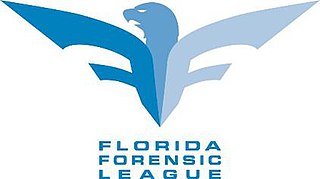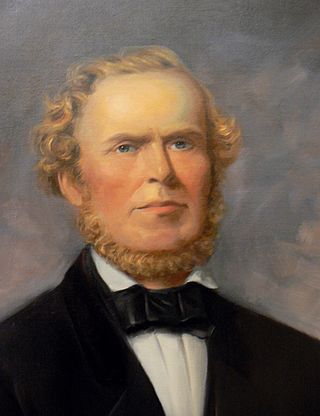Related Research Articles

Escambia County is the westernmost and oldest county in the U.S. state of Florida. It is in the state's northwestern corner. At the 2020 census, the population was 321,905. Its county seat and largest city is Pensacola. Escambia County is included within the Pensacola—Ferry Pass—Brent, Florida Metropolitan Statistical Area. The county population has continued to increase as the suburbs of Pensacola have developed.
The United States District Court for the Northern District of Florida is a federal court in the Eleventh Circuit.

Constitution Convention Museum State Park is a Florida State Park located just outside Port St. Joe, off US 98, in northwestern Florida. The 14-acre (57,000 m2) park contains a museum with examples of 19th-century life in the former town of St. Joseph, and features life-sized figures with audio presentations about the state's first Constitutional Convention. The address is 200 Allen Memorial Way.
St. Joseph was a boomtown that briefly became the largest community in Florida, United States, before being abandoned less than eight years after it was founded. St. Joseph was founded in 1835 on the shores of St. Joseph Bay. A brief period of prosperity was ended by a yellow fever epidemic in 1841, and the abandoned remnants of the town were destroyed by a storm surge in 1844. The town site is in Gulf County, Florida, near the city of Port St. Joe.

The Florida Forensic League, Inc., or FFL, is a speech and debate organization offered to all schools in the state of Florida. It is the governing body for local and state speech and debate competitions in Florida, with higher-level competition under the auspices of the National Forensic League and the National Catholic Forensic League. The league was officially incorporated by the State of Florida on November 20, 2003, and began operations on January 1, 2004, although it existed some time before then in an unorganized fashion. Competitors in the league have been extremely successful at national tournaments.
More than 1,500 African American officeholders served during the Reconstruction era (1865–1877) and in the years after Reconstruction before white supremacy, disenfranchisement, and the Democratic Party fully reasserted control in Southern states. Historian Canter Brown Jr. noted that in some states, such as Florida, the highest number of African Americans were elected or appointed to offices after the end of Reconstruction in 1877. The following is a partial list of notable African American officeholders from the end of the Civil War until before 1900. Dates listed are the year that a term states or the range of years served if multiple terms.

Florida AFL–CIO is a statewide federation of labor unions in the state of Florida affiliated with the AFL–CIO. The federation's membership consists of about 450 local unions from 41 international unions. The headquarters of the organization are located in Tallahassee, Florida.

The Florida First District Court of Appeal, also known as the First DCA, is headquartered in Tallahassee, Florida, the state capital. It is unique among the six Florida District Courts of Appeal in that, much like the U.S. Court of Appeals for the D.C. Circuit at the federal level, it handles most of the appeals in state administrative law matters. It is also solely responsible for handling appeals in workers' compensation cases. It is the Court of Appeals for 29 Florida counties, covering the Panhandle as well as the north-central parts of the state. The First DCA includes the following: First Circuit ; Second Circuit ; Third Circuit ; Eighth Circuit ; and Fourteenth Circuit.
The Northwest Florida Water Management District (NWFWMD) stretches from the St. Marks River Basin in Jefferson County to the Perdido River in Escambia County. The District is one of five water management districts in Florida created by the Water Resources Act of 1972. The District has worked for decades to protect and manage water resources in a sustainable manner for the continued welfare of people and natural systems across its 16-county region. It serves Bay, Calhoun, Escambia, Franklin, Gadsden, Gulf, Holmes, Jackson, Leon, Liberty, Okaloosa, Santa Rosa, Wakulla, Walton, Washington and western Jefferson County.

Thomas Baltzell was an American lawyer and politician who was the first popularly elected chief justice of the Florida Supreme Court. Baltzell was also a Florida Territory Senator and a Florida State Representative as well as a Florida Constitutional Convention delegate for two of the state's Constitutions.

The Florida circuit courts are state courts and trial courts of original jurisdiction for most controversies. In Florida, the circuit courts are one of four types of courts created by the Florida Constitution.
Florida's Constitution of 1885, its fifth, was drawn up by the Constitutional Convention of 1885. The convention was held from June 9, 1885 until August 3, 1885 in Tallahassee, Florida "for the purpose of reforming the "Carpetbag" Constitution of 1868", according to course literature from the University of Virginia. It was Florida's fifth constitutional convention and restored the election of many public officials, reduced the salaries of the governor and other state officers, made the governor ineligible for reelection, abolished the office of lieutenant governor, and provided for a legislature of fixed numbers.
The Legislative Council of the Territory of Florida, often referred to as the Florida Territorial Council or Florida Territorial Legislative Council, was the legislative body governing the American territory of Florida before statehood. The territory of Florida was acquired by the U.S. in 1821 under the Adams–Onís Treaty. Replacing the form of martial law that had existed in the territory since Florida was acquired, the U.S. Congress in 1822 established a territorial government consisting of a governor, secretary, thirteen-member Legislative Council, and judiciary, all of whom were appointed by the U.S. president.

The 1976 United States presidential election in Florida took place on November 2, 1976. All fifty states and the District of Columbia were part of the 1976 United States presidential election. Florida voters chose seventeen electors to the Electoral College, who voted for president and vice president. Florida was won by Georgia Governor Jimmy Carter by a margin of 5.29%, giving him the state's 17 electoral votes.

The 1972 United States presidential election in Florida was held on November 7, 1972, as part of the concurrent United States presidential election. Florida voters chose seventeen electors, or representatives to the Electoral College, who voted for president and vice president. Incumbent Republican President Richard Nixon won the state over the Democratic nominee, South Dakota Senator George McGovern, by a landslide margin of 44.11% and over one million votes.

The 1968 United States presidential election in Florida was held on November 5, 1968. Florida voters chose fourteen electors, or representatives to the Electoral College, who voted for president and vice president.

Benjamin Chaires Sr. (1786–1838) was an American planter, land owner, banker and investor in Territorial Florida, and may have been the richest man in Florida in the 1830s. He was involved in the creation of the first railroads in Florida.
The Fourteenth session of the Florida House of Representatives began December 18, 1865, at the state capitol in Tallahassee, Florida, under a revised Florida Constitution. The legislative session ended January 16, 1866. David S. Walker was governor.
References
- ↑ "Statutes & Constitution". Online Sunshine. Archived from the original on April 6, 2023.
- ↑ "FSU Florida Constitution Revision Commission". Archived from the original on October 30, 2011. Retrieved March 1, 2014.
- ↑ Political graveyard